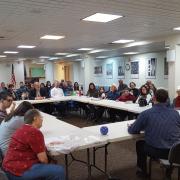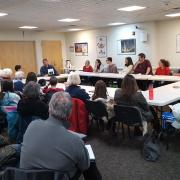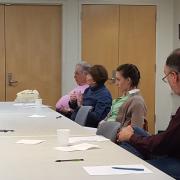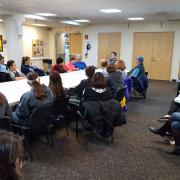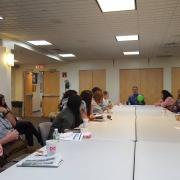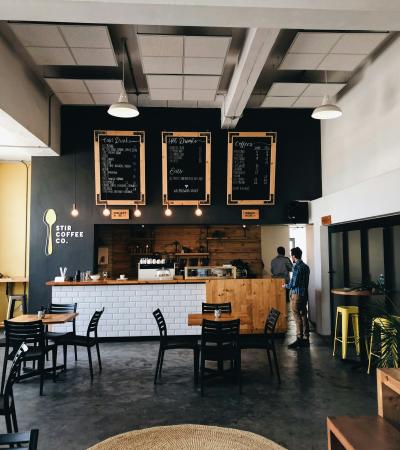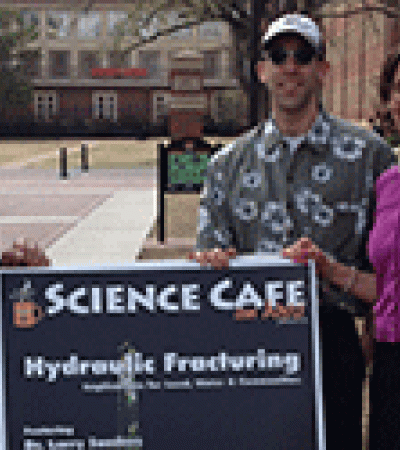The Oceanside Library Science Café is a monthly series in which a scientist presents informally on a current science topic for approximately 10 minutes, followed by discussion and questions from patrons. We use the format created by NOVA, which focuses on presenting science topics in a relatable and engaging way, and in an informal setting. (We also serve coffee and really good cookies.) No PowerPoint or other formal presentation materials are used.
A staff member moderates the discussion to ensure that no one — including the guest scientist — dominates the discussion. Our audience includes adults and advanced high school students.
Advanced Planning
Planning for our monthly Science Cafés occurs approximately two to three months before the scheduled date (to meet our newsletter schedule). Before our first session, I reviewed the NOVA Science Cafés website to get some idea of the format (most are held at university pubs).
To obtain speakers, I email the heads of the various science departments at nearby colleges and universities, as well as science-related groups such as environmental lobbies, science and engineering associations, science hobby organizations, etc. As the program has grown, some of our speakers have recommended us to their colleagues.
I make sure to explain the format for the scientists: no need to prepare multimedia presentations; the initial presentation should be approximately 10 minutes; the program is informal (we sit around a large grouping of tables — seating about 25 — with chairs around the outside for overflow) and is to be on a layperson’s level.
I also do a small amount of research before the presentation so I can ask questions if the discussion lags. I work with the scientist (usually just a few back-and-forth emails) to develop a compelling topic/title.
Marketing
We market as follows:
- Sending fliers about the event to the local high school science chair (some teachers assign it as extra credit)
- Featuring program information in in-house fliers and video kiosks (view sample fliers under Attachments at right)
- Including program information in our newsletter mailed to each home
- Sending out an email blast the week before the program
- Posting information on Twitter, Instagram and our general Facebook page (and sharing it to community pages), as well as the Science Café Facebook page we created to share science posts
- Listing the program in our local newspaper
- Sharing the program with several Meetup groups that cater to science or adults interested in general programming
- Announcing the program before other library programs start
To help garner interest, I have tried to make the topics and titles intriguing. Here are some examples:
- Computer Ethics: Is Privacy Dead? (presented by a college professor in computer ethics)
- Is the Cure for Cancer in Our Reach? (presented by a cancer researcher)
- Can America Ever Be Safe From Global Viruses? (presented by the head of medicine and virologist from a local hospital)
- Dinosaurs: Beyond Jurassic Park (presented by a paleontologist blogger)
- Can Long Island Survive Climate Change? (presented by a geology professor from a local university)
Budgeting
We buy cookies and make a pot of coffee. Cost is approximately $10 to $20 per event. The scientists do not charge a speaker’s fee.
Day-of-event Activity
We set up six folding tables in a large rectangle in our main meeting room and arrange approximately 25 chairs around it. We then circle the table with concentric rows of chairs for overflow.
We set up the coffee and cookies on a side table. We also set up a book cart in the room, displaying books on the topic about to be discussed.
I mark two chairs on either end of the tables as “reserved” for the guest scientist and me. One staff member moderates the program, and the library custodian helps set up and break down the tables and chairs.
Program Execution
I start the program by introducing the scientist with a short bio, and then let him or her give their 10-minute talk. I then moderate to make sure that no one — including the scientist — dominates the discussion. The program lasts about one hour. Our audiences have ranged from a low of 22 to high of 80, and the smaller groups actually engender a better discussion. (View photos of some Oceanside Library Science Café audiences under Photo Slideshow at right.)
One challenge has been handling a few exuberant students seeking to dominate the conversation. I try to walk the line between not discouraging the student and yet allowing others to make comments and ask questions.
We display books on the topic on a cart in the room, and several are typically taken out after each program.
The Science Café is one of several new programs we've added over the last year or so, which has resulted in an overall increase in our program attendance by 34 percent. We have not yet used a formal outcome survey. We feel the program has met its goals: it has been popular; the attendees are engaged and often stay after to continue the discussion among themselves, and it fills a need in our programming lineup for a science-based program.
Advice
Don’t be afraid to contact the scientists. Many love teaching and welcome an opportunity to share their passion with others. (View a sample speaker invitation under Attachments at right.)
Ask open-ended questions if the conversation lags or goes off on a tangent. Have at least one question for the group at large. For instance, when we had a computer ethicist talking about internet privacy, I asked the room if they would be willing to give the government complete access to their emails, etc., in exchange for a higher degree of security. We went around the room — and the conversation got enthusiastic to say the least!.

